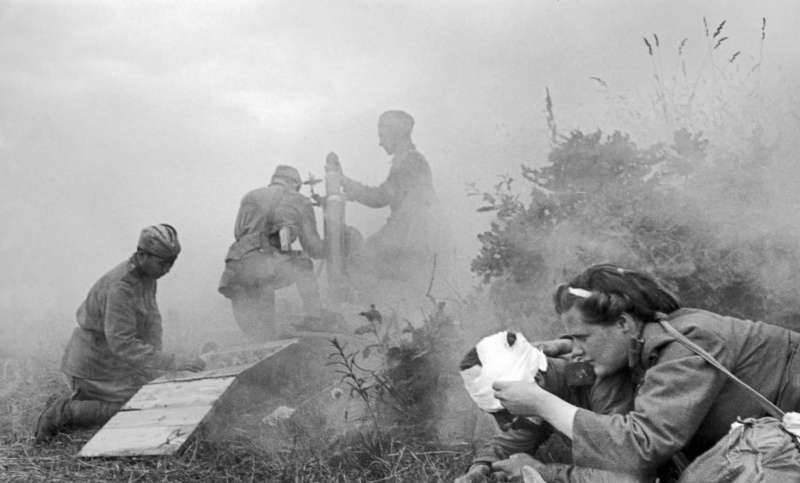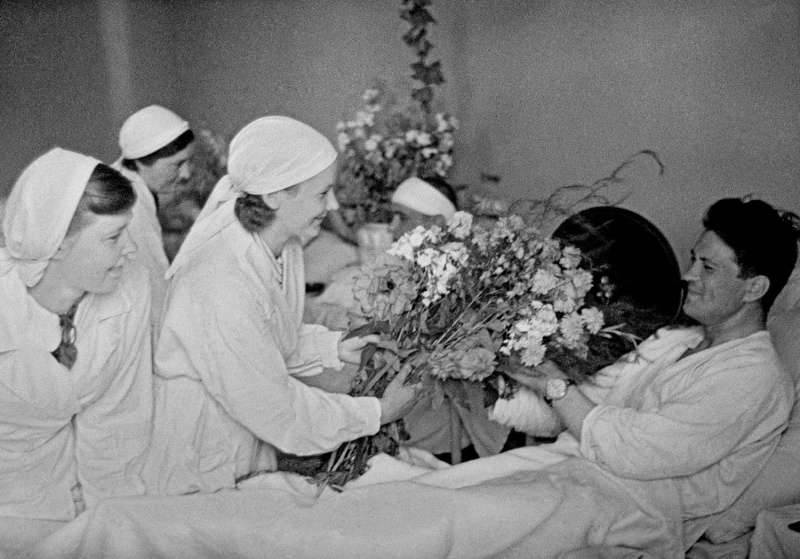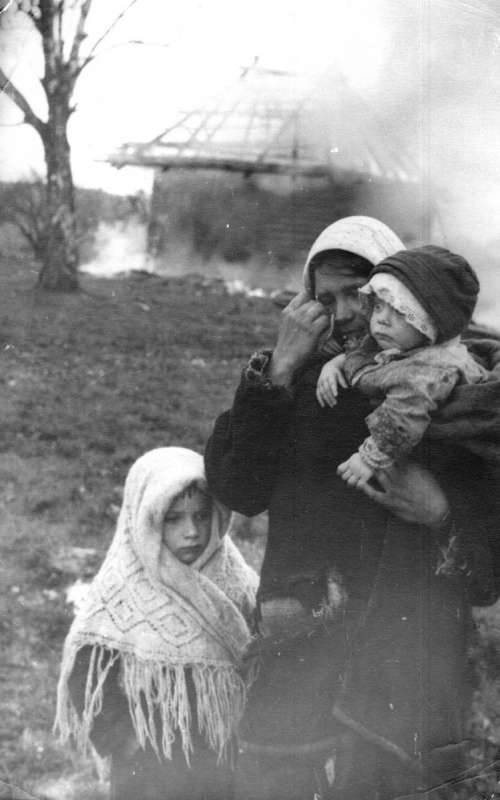Such a war. Fist front and rear. Part of 3

It's hard to find in stories Soviet Union event that would unite the people as the Great Patriotic War. At this time, almost every Soviet person not only felt his personal responsibility for the country, but could also influence the course of the war. How many times have we heard that the Soviet people stood up as one to fight the enemy. How many times did not get tired to be amazed at human courage, heroism, and selflessness. The front and rear became a single, indestructible whole, monolithic fist, where there were both women's and children's hands.
Valentina Mazanova recalls and wonders to herself, the then senior lieutenant of the medical service: “There was no particular fear then. At first, of course, it was not for myself. And then, of course, you get used to it. ”
At war, Valentine turned out to be a 18-year-old girl. “At first we were assigned to the medical battalion of the Siberian rifle division, which was being formed in the city of Abakan, and then moved in a train through the whole country, towards war,” she recalled.
On the way, they received an order - to stop the advance of the Germans on the Voronezh front. Almost immediately they entered the battle.
"The Germans could not stand our" cheers "and retreated before hand-to-hand, lay down and opened fire on our soldiers. There were wounded. And I rushed with my sanitary bag to the call of “sister, sister,” says Valentina Mazanova.
The wisdom of field medicine young nurses comprehended in combat conditions.
The most difficult thing was to help the seriously wounded. “Sometimes you look, the thigh is so torn apart by a splinter that all the tissues, veins, and nerves spill out. Well, nothing got used with time. There was no need for emotion, it was necessary to quickly render assistance, ”recalls Mazanova.
In the battle near Kharkov, the nurse Valentina Mazanova was seriously wounded. “Something strong hit me in the face. I thought that it was a cold clod of earth - because shells were torn around. And I would never have thought that the bullet had entered the chin, cut the jaw and went out somewhere below the neck. My camouflage gown began to fill with blood. "
From this time left a certificate of injury. “In the battles for the Soviet homeland, the foreman caretaker Plyonkin (maiden name) Valentina Ivanovna was seriously injured in January 1942.”
Valentina spent six months in the hospital. She returned to the battalion of the 1 of the Byelorussian Front, where she was later identified by the medical instructor and the company Komsomol.
“Once I was going to the dugout, and from there a young officer ran out and looked at me closely. Then we all looked at each other. So they looked to Berlin, ”Valentina recalled.
She went through the whole war. In the summer of 1944, she participated in the largest offensive operation, Bagration. Together with his comrades reached the walls of the Reichstag.
“I have a photo where we sit at the table, all have iron circles, poured them a hundred grams for the Victory. All fired in the air. Of all kinds weapons».
The war has no female face. Everyone knows about this expression. In peacetime, it is difficult to imagine how women, created by life to continue it, existed in war, and overcame fear every day.
The war was scary, and the woman - doubly scary. This can tell any party to the war. And women were afraid, first of all, maybe not of death, but to become crippled, disabled, to remain disfigured, to lose their female attractiveness. They were mortally afraid of being taken prisoner because they were well aware of the torments they were to endure. There were many fears, but this did not prevent our women from fighting on equal terms with men, heroically overcoming all the difficulties of wartime.

How many lives are saved by the same girl-nurses? This is not in any statistics. But there are memories, and among them the story of an outstanding Soviet film director Rostotsky (shot the film “And the Dawns Here are Quiet” and others) about her rescuer Ana Chepurna, who did what today's resuscitators do: she constantly watched the condition of the seriously injured, passing out of life, and she did not allow him to leave this world so early, introduced medicines to him, pulled him out of oblivion. After the war, Rostotsky found Anya and was friends with her all his life.
When the film premiered, Anya could not watch it, but only listened: she developed a severe form of cancer, which led to blindness.
The published book and the film released three years later told about the absolute tragedy of women in the war.
True, there were no generals during the war years among women, but a few colonels stood in the Red Army.
The feat of a woman in a war is much more valuable than a man’s. It's clear. War and woman - concepts, of course, are incompatible.
Women ambassador Victory demobilized in the first place, sent home. But our heroine, Valentina Ivanovna, had to linger in Berlin: a young officer, whom she met at the entrance to the dugout, asked for permission to marry her. Valentina Ivanovna shows the surviving marriage certificate of wartime - the usual yellowed sheet A4. In Berlin, they played the only battalion wedding: they laid long tables and drank both for the young and for staying alive.
Galina saved by the army
In August, 1941, a graduate of the Leningrad decade, Galina Matveyeva, as well as her countrymen, dug trenches. Soon, September 8 1941, the blockade of Leningrad will begin.
She became a telephonist in the control squad: you had to go 17 kilometers to work and back home, holding an 250-gram slice of bread.
“Mom told me not to watch or touch bread at all. And my mother admonished me - not food is more important, but work, movement. Look, how to break a chair, ”recalls Galina Matveyeva.
And suddenly she received a summons to the draft board. She realized that she was saved. The doctor who examined Galya did not believe that she was eighteen years old: the emaciated girl looked twelve years old, but she still went to war, persuading both the commander in the military office and herself that she could take it all. And for the first six months she could not do anything - she was rescued by stronger girls and only told her to hold on. And then Galina was able to fully carry out the tasks.
Valentine and Maria
A lot of kind words were said to the address of their oldest readers by members of the family reading library, which is located in Novaya Sokolovka. Despite her age, Valentina Aleksandrovna Kuznetsova and Maria Vasilyevna Ushakova visit the library with an enviable constancy. “We cannot live without books,” they almost say with one voice.
Maria Vasilievna loved to read books as long as she remembered. “But there were no books in the war,” she sighs. And it wasn’t until reading the girls and boys of that time. Maria Vasilievna recalls how she and her classmates collected empty bottles. Then they were filled with fuel mixture, and the soldiers at the front set fire to enemy Tanks. And Maria Vasilyevna remembered how she was traveling home from her grandmother on a medical train. I jumped onto the bandwagon, grabbed onto the handrails - hard, scary, but somehow I had to get home. It’s good that the girl was noticed by doctors, dragged into the vestibule, warmed up.
The train slowed down in Krasniy Sulin, and she managed to get off at her home station.
After seven years entered the courses of accountants. She worked in the accounting department at the Zapadnaya-Kapitalnaya mine. Later, fate brought Maria Vasilievna to Volgograd, where her sister worked at the train station. She helped get her a job. And 24, until she retired, Maria worked as a cashier. She loved her job very much because she constantly communicated with people.
In 1995, Maria Vasilyevna returned to the town of Novoshakhtinsk and settled in the village of Novaya Sokolovka. And almost immediately entered the library.
Her friend Valentina Alexandrovna is not talkative. “What to tell? Because of the war, we had neither childhood nor youth, ”she says. The share of Valentina Alexandrovna fell through the occupation - a difficult, hungry time. Then there was liberation and labor on a par with adults. She still remembers how, during the harvest, they, teenagers, went to the farm NK 6, helped to blow and dry the grain.
Then there was a study at the technical school and a job as a timekeeper at the Zapadnaya-Kapitalnaya mine. Before launching the mine named after the newspaper Komsomolskaya Pravda, Valentina Alexandrovna switched to this company, where she worked until her retirement.
“I didn’t sell my son, I sent him to protect the Motherland”
Also today I bring to your attention the memories of a person who gave his life to orphans, former director of Novoshakhtinsky orphanage, honored teacher of Russia, labor veteran, home front worker Nina V. Goncharova
“The Great Patriotic War began on June 22 of the year exactly at 1941 in the morning. And since the morning my father Vasily Afanasyevich Goncharov and almost all adult men went to the village council. They went to the front at the call of their hearts to volunteer to defend their homeland. Only women, old people, and children remained in our village. The front needed bread. And we, children, grown wheat with adults. They sowed wheat, and weed it. When it matured, they mowed it manually - with sickles and braids, since at that time there was only one combine on the collective farm. Then the sheaves were threshed on the threshing machine, the resulting grain was blowing and already clean was sent to the village of Kushchevskaya on the elevator, 4 kilometers from our village Glebovka. It was very hard, it was not child labor. We had bloody, blue calluses on our hands, we breathed in dust mixed with ustyugami. But we did not cry, bravely endured all this, considering that we, too, are at war, helping the front.

And the front was approaching, Rostov surrendered. Our mothers and the remaining elderly men left for Kuschevka to dig trenches and anti-tank ditches to delay the rapid advance of the German troops. Soon, and for us, for 30 kilometers from our village, fierce battles began for the hamlet of Popovka, located on a hill. They lasted three days. In our homes from the explosions of bombs, the walls were wobbling and glass was falling. In our village began to bring the wounded.
On the third day the bombing stopped, there was a "dead" silence. Even birds and animals felt trouble. In our village, almost no one had a watch. Mom, like all women, woke up at dawn with a rooster crow. This morning he was not there, and there was no dog barking. And only the sound of the wheels of the wagon broke the silence.
Our house was located in the center of the village. There was a groan from the wagon. A carter soldier approached his mother and began to ask her to leave his wounded friend and save him. Mom left the wounded. He was taken to a health center, where an evacuated doctor removed fragments from his body. Soldier's clothes burned, dressed in civilian clothes. On the door of the health center wrote "Tif", and the Germans were very afraid of him. This wounded soldier was with us until his recovery, his name was Volodya, I don’t know his last name. Having recovered, he went to look for his part.
During the retreat of the German troops we had to go through a lot. It was winter. One evening, the car rang. The yard was lit with lots of headlights. The Germans entered the room. My mother and the women who spent the night at our place were driven out to the street. We spent the night in a barn with cows and sheep.
There was a rapid onset of our troops. The Germans left our village without resistance. We rejoiced in our liberation, but our sufferings did not end there. After ten classes, my classmates voluntarily went to the front. Misha Mikhaylenko, with whom we sat at the same 10 desk for years, also left. And my brother Alexander went with him. Two months later, I received a letter from Misha in which he explained his love for me and asked me not to marry until he returned from the front. I replied that I love and will wait. Three months there was no response from him. Soon I received a letter and saw that the envelope was signed not by his hand. I opened it and read it: “Your friend Mikhail Mikhaylenko died the death of the brave in the fight against the fascists ...” So I lost my first love and the best friend of my childhood.
Every day, all the inhabitants of our village waited with fear for the mail, because after it came from all over the village there was a cry of mothers and wives who had lost their loved ones. Soon the mother received a notice of the death of her beloved son Shurik. She did not cry, she was silent for two months, walked like a wounded bird in the yard, looked at my sister and her eyes that did not see anything, occasionally whispered: “Shurik, the only one ...”
After some time, she brought a pension for the deceased breadwinner. One had to see with what anger she said: “I didn’t sell my son, I sent him to protect the Motherland,” and received a lifetime retirement pension.
Information